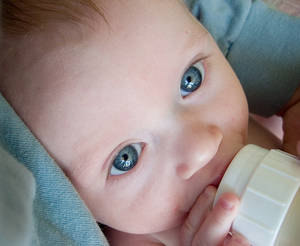Breast-feeding manipulates the microbes in the intestine, which  in turn produces lifelong changes in the fabric of the immune system, a new study has shown.
in turn produces lifelong changes in the fabric of the immune system, a new study has shown.
For years nutritionists have counselled parents that "breast is best", citing a reduced risk subsequently of obesity, diarrhoeal diseases, allergies and even autoimmune conditions.
But the reasons underlying these beneficial effects, which persist long after the period of breast-feeding is over, are poorly understood.
Now a new study comparing a group of breast and bottle-fed monkeys has revealed that the effect might be down to the way breast milk manipulates the spectrum of micro-organisms that colonise the intestine.These, in turn, mould the developing immune system.
Writing in Science Translational Medicine, UC Davis scientist Dennis Hartigan-O'Connor and his colleagues studied 12 baby macaques, half of them breast-fed and half nursery-reared with bottled milk.
Between the ages of 5 and 12 months the researchers sampled the bacteria colonising the animals' intestines and also, by studying blood samples, analysed the profile of immune cells that develop as the infants matured.
From very early on differences were apparent.
The breast-fed animals had significantly higher levels of certain bacterial groups including the species Prevotella, Ruminococcus and Lactobacillus. The bottle-fed babies, on the other hand, had relatively higher levels of Clostridium.
These effects were still apparent months after both groups of animals had been weaned and were eating identical diets, showing that the influence of breast milk on the intestinal microbial spectrum is likely to be lifelong.
And comparing the immune systems of the two groups showed that the breast-fed animals had a more robust population of immune memory cells, produced more immune signals when blood samples were stimulated and also had more "helper" lymphocytes called Th17 cells, which help to defend the body against infections caused by bugs like Salmonella.
The team also studied the chemicals and metabolites produced by the gut microbes of the two groups of monkeys.
Again, there were clear differences in some of the chemicals being produced, reflecting the different microbial populations. Critically, some of these metabolites strongly influence the maturation of the immune system.
This suggests, says the UC Davis team, that breast milk probably exerts its beneficial effects in part by manipulating the microbes that colonise the intestine. These, in turn, then produce a cocktail of chemicals and metabolites which mould the developing immune system making it strongly react to harmful threats but less likely to produce allergic reactions.









Comments
Add a comment